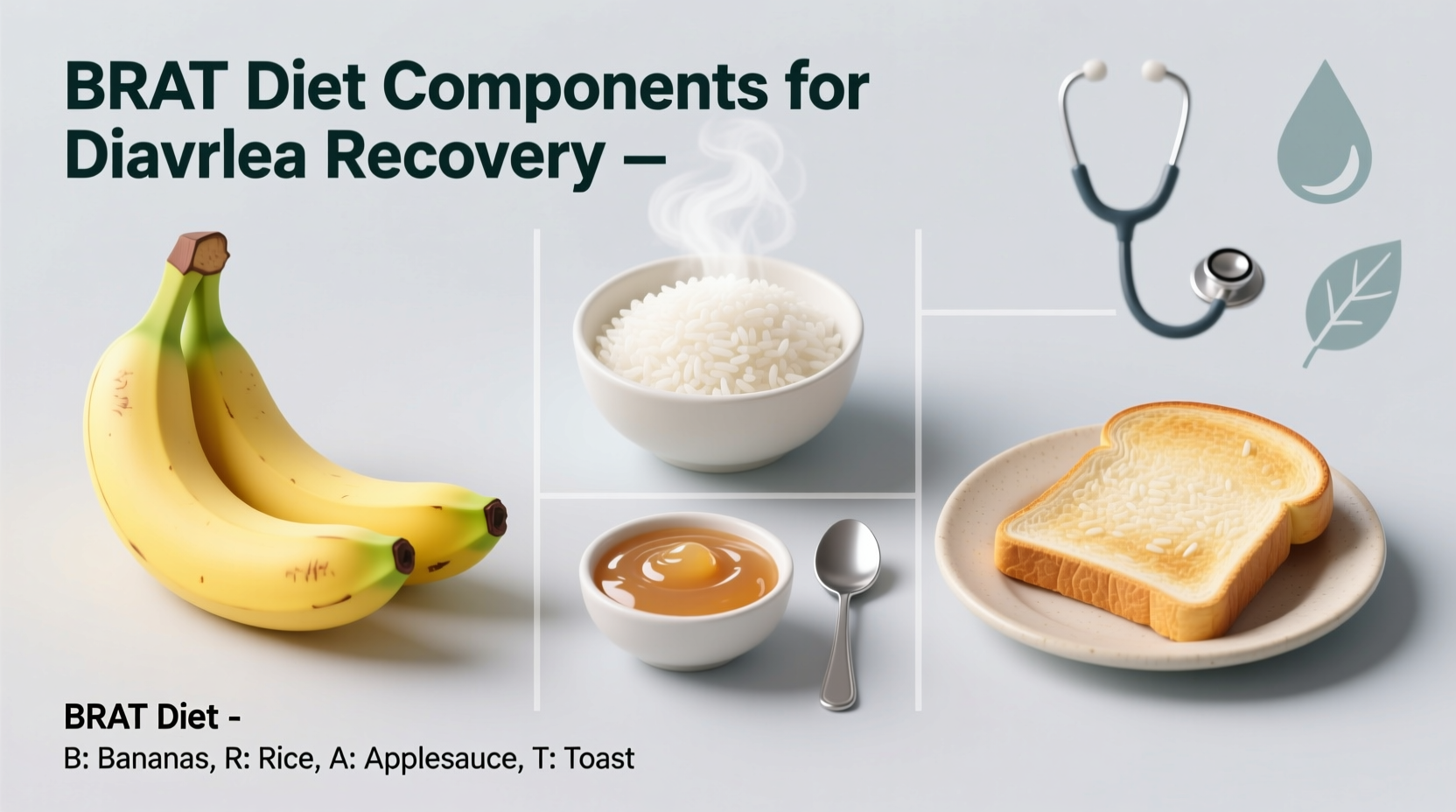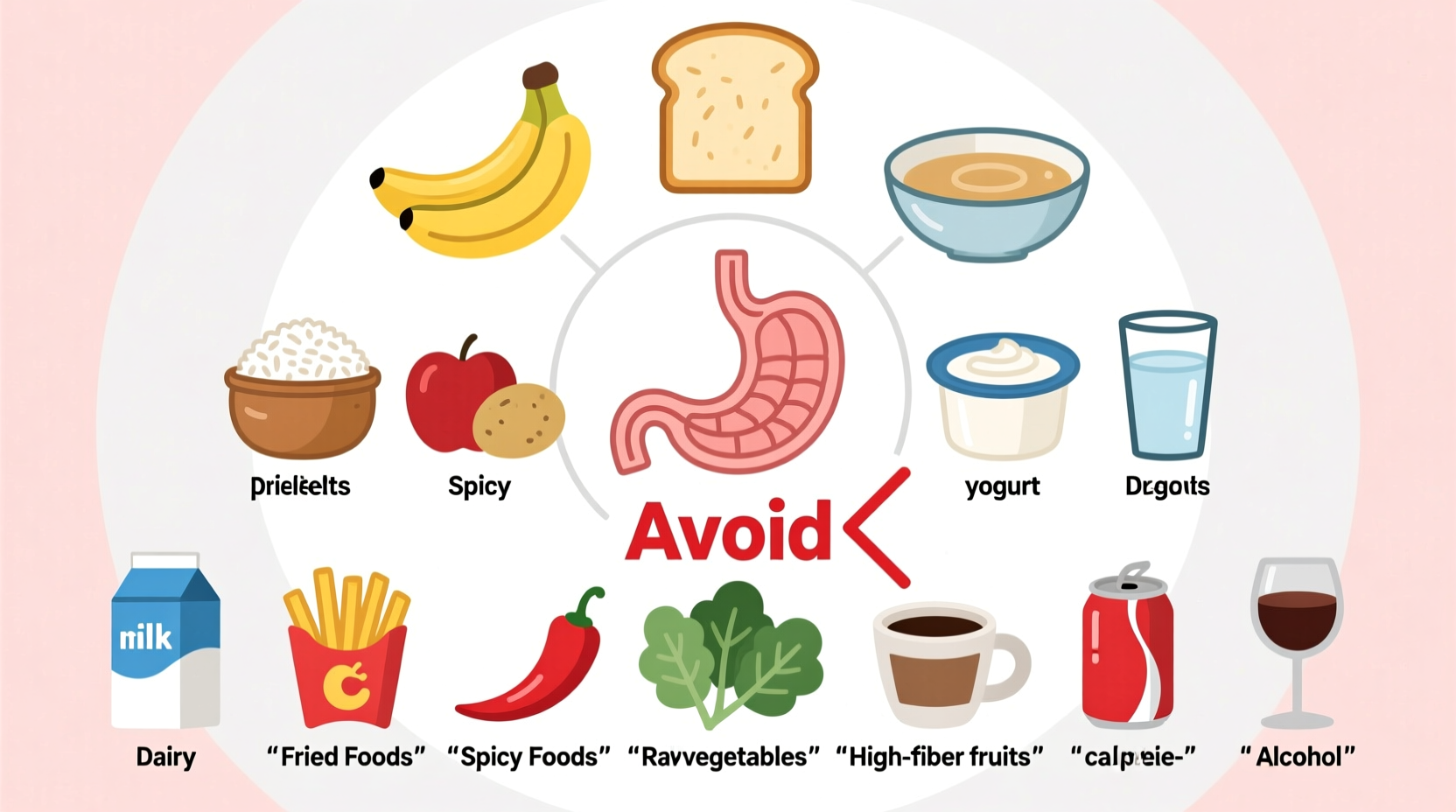If you're experiencing diarrhea, immediately avoid dairy products, greasy or fried foods, spicy dishes, artificial sweeteners, and high-fiber foods like raw vegetables and whole grains. These commonly trigger further irritation to your sensitive digestive system. Instead, focus on the BRAT diet (bananas, rice, applesauce, toast) and stay hydrated with clear fluids. Most cases resolve within 48 hours with these dietary adjustments.
When diarrhea strikes, your digestive system is in a delicate state. Choosing the right foods can significantly shorten your discomfort while the wrong choices may prolong symptoms for days. As someone who's worked with nutritionists in professional kitchen settings to understand food chemistry, I've seen how specific dietary choices directly impact digestive health. This guide provides evidence-based recommendations to help you navigate food choices during diarrhea episodes, backed by medical research and digestive health experts.
Why Certain Foods Worsen Diarrhea Symptoms
Your digestive tract becomes hypersensitive during diarrhea. Foods that are normally well-tolerated can suddenly trigger additional irritation when your gut lining is inflamed. The digestive system's reduced ability to process certain components—like lactose in dairy or fats in fried foods—means these substances pass through undigested, drawing more water into the intestines and worsening symptoms.
Foods to Immediately Avoid During Diarrhea
Understanding which foods to eliminate from your diet provides immediate relief. Medical professionals consistently recommend avoiding these categories when experiencing diarrhea:
| Foods to Avoid | Why They Worsen Symptoms | Typical Recovery Timeline After Avoidance |
|---|---|---|
| Dairy products (milk, cheese, ice cream) | Temporary lactose intolerance often develops during diarrhea as gut lining heals | 24-48 hours improvement after elimination |
| Fatty, greasy, or fried foods | Difficult to digest, speeds intestinal contractions | Noticeable improvement within 12-24 hours |
| Spicy foods and hot peppers | Irritates already sensitive intestinal lining | Symptoms may worsen immediately |
| Artificial sweeteners (sorbitol, mannitol) | Osmotic effect draws water into intestines | Worsens symptoms within hours |
| High-fiber foods (raw vegetables, whole grains) | Increases stool bulk and intestinal movement | May prolong symptoms by 1-2 days |
Contextual Boundaries: When These Guidelines Apply
These recommendations apply specifically to acute diarrhea cases lasting less than two weeks. According to the Centers for Disease Control and Prevention, most diarrhea cases are short-term and resolve with proper dietary management. However, chronic diarrhea lasting more than four weeks requires medical evaluation as it may indicate underlying conditions like inflammatory bowel disease or celiac disease where different dietary approaches are necessary.
The BRAT Diet: What to Eat Instead
While avoiding problematic foods, focus on these gentle options that help firm stools:
- Bananas - Rich in potassium which is often depleted during diarrhea
- Rice - White rice is low in fiber and helps bind stools
- Applesauce - Contains pectin which helps firm stools
- Toast - Plain white toast is easily digestible
Additionally, clear broths, oral rehydration solutions, and herbal teas like chamomile can help maintain hydration without irritating your system. The UK National Health Service recommends drinking at least 200ml of fluid after each loose stool to prevent dehydration.

When to Seek Medical Attention
Most diarrhea cases resolve within 48 hours with dietary adjustments. Contact a healthcare provider if you experience:
- Diarrhea lasting more than 2 days
- Signs of dehydration (extreme thirst, dry mouth, dizziness)
- Blood or pus in stool
- Severe abdominal pain
- Fever above 102°F (39°C)
The Mayo Clinic emphasizes that infants, young children, and older adults require prompt medical attention for diarrhea due to higher dehydration risks.
Reintroducing Normal Foods
As symptoms improve, gradually expand your diet over 2-3 days. Start with:
- Cooked vegetables (carrots, green beans)
- Lean proteins (chicken, turkey)
- Cooked fruits (pears, apples)
- Oatmeal
Avoid rushing back to your regular diet. The American College of Gastroenterology notes that reintroducing problematic foods too soon can trigger symptom recurrence, extending your recovery time.
Preventing Future Episodes
While you can't prevent all diarrhea cases, these practices reduce risk:
- Practice thorough handwashing, especially after using the bathroom
- Ensure proper food handling and cooking temperatures
- Stay up to date with vaccinations, including rotavirus for children
- Be cautious with food and water when traveling internationally
Frequently Asked Questions
Can I drink coffee when I have diarrhea?
No, coffee should be avoided as caffeine stimulates intestinal activity and can worsen diarrhea. Both regular and decaffeinated coffee contain acids that irritate the digestive tract. Opt for herbal teas like chamomile or peppermint instead, which have soothing properties.
Is yogurt good for diarrhea despite being dairy?
Plain yogurt with live active cultures may actually help some people with diarrhea. The beneficial bacteria can help restore gut flora balance. However, if you're experiencing acute symptoms, start with non-dairy probiotic sources like kefir (if tolerated) or probiotic supplements, then introduce yogurt as symptoms improve.
How long should I follow the BRAT diet?
The BRAT diet is designed for short-term use during acute diarrhea symptoms, typically 24-48 hours. Prolonged use (beyond 3 days) isn't recommended as it lacks sufficient protein, fat, and other nutrients needed for complete recovery. Gradually reintroduce other foods as symptoms improve.
Are bananas really effective for diarrhea?
Yes, bananas are particularly effective during diarrhea recovery. They contain pectin, a soluble fiber that helps firm stools, and are rich in potassium which is often depleted during diarrhea episodes. Choose ripe bananas as they're easier to digest than green ones which contain more resistant starch.
Can I eat eggs when I have diarrhea?
Yes, cooked eggs can be included once initial symptoms begin improving. Start with small portions of hard-boiled or poached eggs, which are easier to digest than fried eggs. Avoid butter or oil when preparing eggs during diarrhea recovery. Eggs provide needed protein without irritating the digestive system when properly prepared.











 浙公网安备
33010002000092号
浙公网安备
33010002000092号 浙B2-20120091-4
浙B2-20120091-4